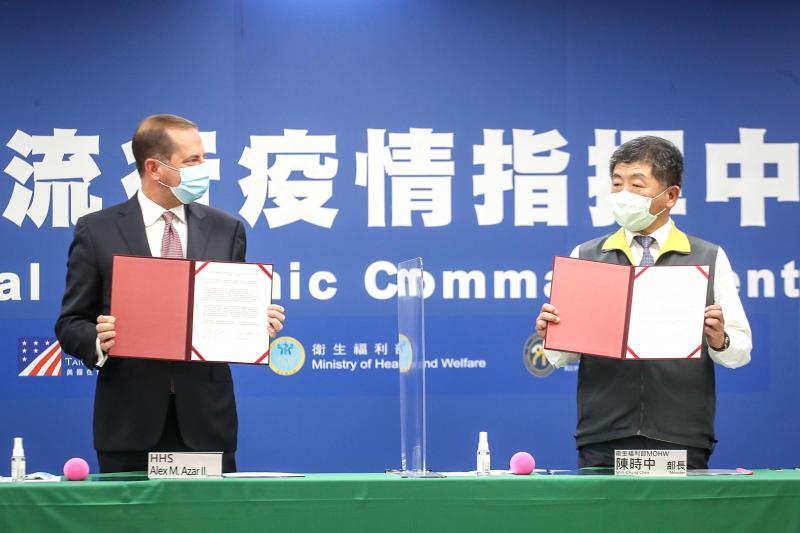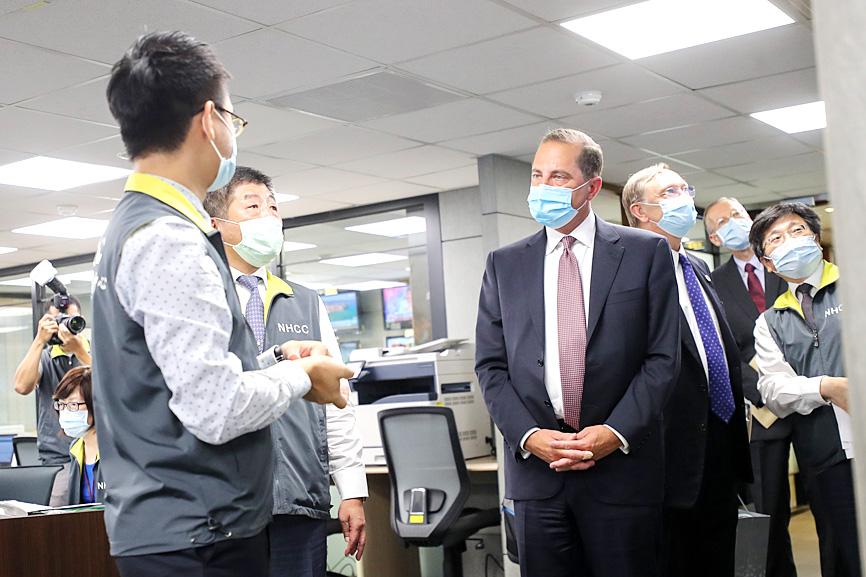The first memorandum of understanding (MOU) on health cooperation between the Ministry of Health and Welfare and the US Department of Health and Human Services was yesterday signed at the Centers for Disease Control in Taipei.
The memorandum was signed between the American Institute in Taiwan (AIT) and the Taipei Economic and Cultural Representative Office in the US, by AIT Director Brent Christensen and Taiwan Council for US Affairs Chairperson Jen-ni Yang (楊珍妮).
US Secretary of Health and Human Services Alex Azar and Minister of Health and Welfare Chen Shih-chung (陳時中) witnessed the signing of the memorandum, designed to enhance the nations’ collaboration on health issues.

Photo: CNA
At the ceremony, Yang said that this year “has been a challenging year, as the world has been struck by a public health crisis caused by COVID-19 and an economic slowdown, yet we see Taiwan-US relations continuing to grow stronger.”
A US-Taiwan joint statement signed in March related to cooperation on fighting COVID-19 served as a framework for collaboration and exchanges that include research and development of rapid tests, vaccines, medicines and medical technology, she said.
The Ministry of Foreign Affairs has also held more than 30 videoconferences with various sectors in the US to share Taiwan’s experience in fighting COVID-19, Yang said, adding that Taiwan has donated more than 12 million Made in Taiwan masks to the US, showing that “Taiwan can help” and “Taiwan is helping.”

Photo: CNA
“Taiwan has much to share with the world on how to manage pandemic diseases, and what has been dubbed the ‘Taiwan model,’” Christensen said. “Taiwan has not only been able to contain the COVID-19 pandemic in Taiwan, but has also lent a helping hand to others in this effort by donating lifesaving personal protective equipment, including millions of masks to the United States, the EU and other partners around the world.”
“The ‘Taiwan model’ is based on our shared democratic values of transparency, inclusion and rule of law,” he added.
“Taiwan has demonstrated time and again that it is a reliable partner and a force for good in the world. Moments like these are exactly why we describe the US-Taiwan relationship as ‘real friends, real progress,’” he said.
Taiwan’s part of the MOU would be handled by the Ministry of Health and Welfare, Chen said, adding that the areas of cooperation include global health security, infectious disease prevention and control, chronic disease prevention and treatment, health promotion, digital health, public health laboratories and drug misuse prevention.
“The cooperation activities include programs, personnel exchanges, training and bilateral visits, workshops and conferences,” he said. “Through these concrete actions, we hope to improve the health and well-being of the people of Taiwan and the US, and also promote global health security in the Indo-Pacific region, as well as across the world.”
Taiwan and the US have more than 20 years of robust and wide-ranging public health relations, from the SARS outbreak response, to cancer and vaccine research, and regional information sharing efforts, Azar said.
He said that he has appreciated his discussions with Chen on the sidelines of the World Health Assembly (WHA), where “the US has aggressively pressed, for the last four years, to restore Taiwan’s role as an observer.”
Azar congratulated Chen, his team of public health professionals and everyone in Taiwan on the success of the “Taiwan model,” saying that not only have the best scientific and public health methods been applied to confront COVID-19, the open and democratic spirit that defines Taiwan was also part of the response.
Through the joint statement and the MOU, the US and Taiwan are to continue to collaborate in important areas, such as investing in next-generation COVID-19 diagnostic testing, including a more than US$2 billion program, and working together and sharing information on vaccine and therapeutic research, Azar said.
Azar said the US’ Operation Warp Speed is pushing to develop vaccines and therapeutics, but the first priority is to develop and produce enough safe and effective FDA-approved vaccines and therapeutics for use in the US, but once the capacity meets the needs, the products would be fairly and equitably distributed to the world community.
Regarding why he made the visit now, Azar said that “this visit represents an acknowledgment of the United States and Taiwan’s deep friendship and partnership, across security, economics, healthcare, and democratic, open and transparent values.”
Taiwan has been a model of transparency, collaboration and cooperation in public health and information sharing, he said. “In the middle of COVID-19, it is critical that we support and recognize those who share the values of transparency in healthcare.”
The WHO removed Taiwan’s WHA observer status four years ago, an action that “deprived the world and the international public health community of the significant expertise and world-class public health infrastructure of Taiwan,” Azar said.
“At [US] President [Donald] Trump’s direction, I and US Secretary of State Mike Pompeo have fought each year to restore Taiwan’s observer status at the WHA, but the Chinese Communist Party and the WHO have prevented it,” he said. “This has been one of the major frustrations that the Trump administration has had with the WHO and its inability to reform.”
Azar recalled when he and Chen in 2018 met in Geneva outside the WHA, when the WHO was dealing with the first of three Ebola outbreaks in the Democratic Republic of the Congo (DR Congo), and that WHO Director-General Tedros Adhanom Ghebreyesus had made an urgent plea for additional funding from member states.
“The US has always generously contributed, and China had not contributed,” he said. “Even though it had been denied observer status, Taiwan generously offered US$1 million to the WHO to support this emergency response in DR Congo, but at the direction of Beijing, the WHO refused this contribution.”
“On behalf of President Trump, I am here to highlight the importance of Taiwan in the international public health community, the contributions that it has made and can make, and of course the close partnership and friendship between the US and Taiwan,” he said.

CAUTION: Based on intelligence from the nation’s security agencies, MOFA has cautioned Taiwanese travelers about heightened safety risks in China-friendly countries The Ministry of Foreign Affairs (MOFA) yesterday urged Taiwanese to be aware of their safety when traveling abroad, especially in countries that are friendly to China. China in June last year issued 22 guidelines that allow its courts to try in absentia and sentence to death so-called “diehard” Taiwanese independence activists, even though Chinese courts have no jurisdiction in Taiwan. Late last month, a senior Chinese official gave closed-door instructions to state security units to implement the guidelines in countries friendly to China, a government memo and a senior Taiwan security official said, based on information gathered by Taiwan’s intelligence agency. The

Taiwan Semiconductor Manufacturing Co (TSMC), the world’s largest contract chipmaker, said yesterday that it is looking to hire 8,000 people this year, at a time when the tech giant is expanding production capacity to maintain its lead over competitors. To attract talent, TSMC would launch a large-scale recruitment campaign on campuses across Taiwan, where a newly recruited engineer with a master’s degree could expect to receive an average salary of NT$2.2 million (US$60,912), which is much higher than the 2023 national average of NT$709,000 for those in the same category, according to government statistics. TSMC, which accounted for more than 60 percent

Tung Tzu-hsien (童子賢), a Taiwanese businessman and deputy convener of the nation’s National Climate Change Committee, said yesterday that “electrical power is national power” and nuclear energy is “very important to Taiwan.” Tung made the remarks, suggesting that his views do not align with the country’s current official policy of phasing out nuclear energy, at a forum organized by the Taiwan People’s Party titled “Challenges and Prospects of Taiwan’s AI Industry and Energy Policy.” “Taiwan is currently pursuing industries with high added- value and is developing vigorously, and this all requires electricity,” said the chairman

The National Immigration Agency (NIA) said yesterday that it will revoke the dependent-based residence permit of a Chinese social media influencer who reportedly “openly advocated for [China’s] unification through military force” with Taiwan. The Chinese national, identified by her surname Liu (劉), will have her residence permit revoked in accordance with Article 14 of the “Measures for the permission of family- based residence, long-term residence and settlement of people from the Mainland Area in the Taiwan Area,” the NIA said in a news release. The agency explained it received reports that Liu made “unifying Taiwan through military force” statements on her online